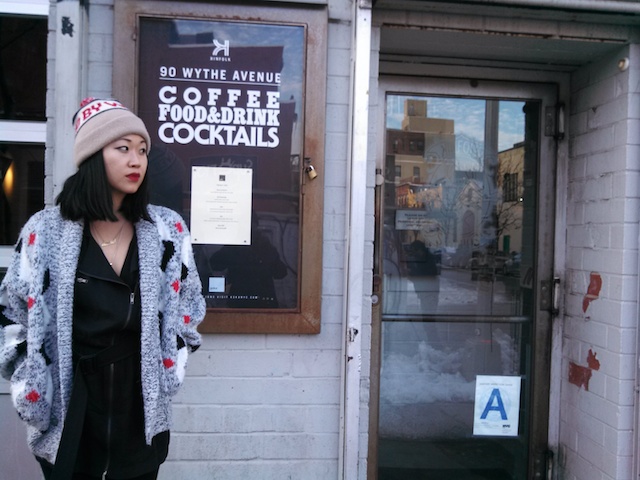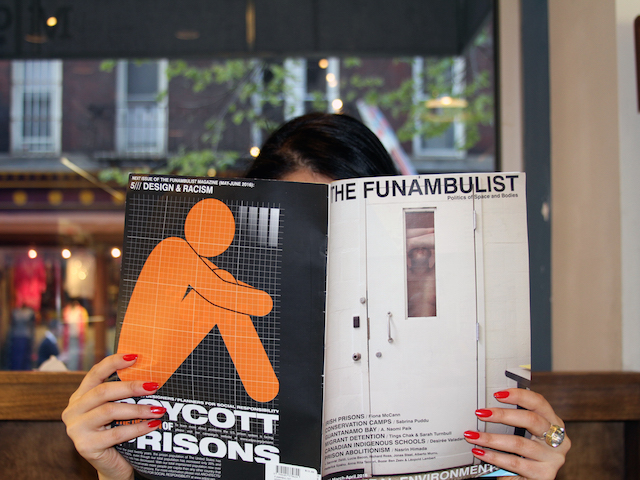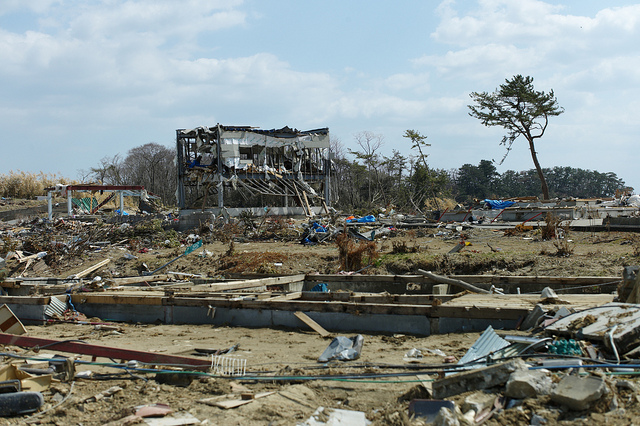Ashok speaks to Miho Hatori of Cibo Matto about her new creative endeavors, Tokyo versus New York, and what gets lost in translation.
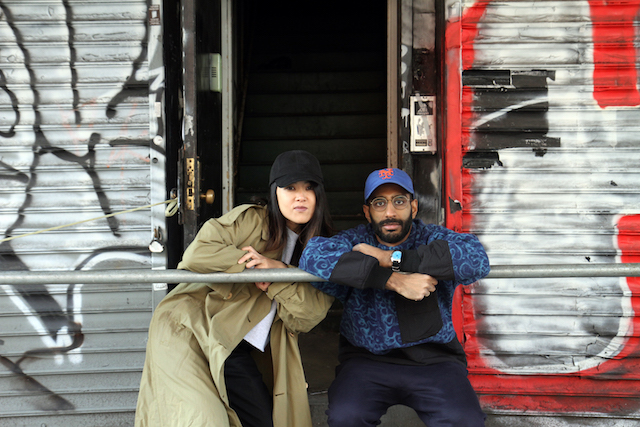
July 21, 2017
I’ve been a fan of Miho Hatori’s music since high school, when she was part of the seminal Cibo Matto with Yuka Honda, as well as the short-lived supergroup Butter 08. We first met when I was doing projections at a show at Trans-Pecos in Ridgewood where her new solo project New Optimism was playing. Miho has described New Optimism as comparable to physics in that it “helps find notes and words out of dark matter” and that it’s “primitive” in the way it “could be something I have lost or something I have found in instinct or human nature.” She says cool shit like that pretty often!
The music was heavily electronic at some points, and at others seamlessly incorporated elements of Brazilian music or jazz. Like her earlier work, it was eclectic without seeming forced or false. She came up to me afterwards to tell me she liked the projections and we struck up a bit of a friendship.
This interview was conducted in late 2016, a few days after Miho got back from tour. We had planned to walk and talk in the New Museum (which probably would have been obnoxious, but fun) but it was closed, so we drank tea at a cafe nearby and chatted it up.
You and your band just went on tour in Japan a few weeks back. How was that?
It was fun. I did this EP by myself. I just made 500 [copies]. No label, nothing, I just went there to play a show. Because, to be honest with you, I feel it’s just sometimes overwhelming to think about finding a label.
But New Optimism is something I purely believe [in]. I felt like it’s like a new challenge for me. I just wanted to go there and show the flavor of New Optimism with no intention of business. Of course I have to do business but something about it made me think about [how] I’ve been doing music for a long time but it’s always got to have fun to have our profession. I feel like I need to reset my mind. What is music? What is my profession? What is my passion? What is it that I really want to bring to the street? Bring to tell to people?
I do love to have that kind of optimistic idea in this dark world. I don’t want to be lightweight, and just optimistic. I do feel like [New Optimism] is music but at the same time it’s a philosophy and a lifestyle.
It’s still challenging because financially it’s a lot of work and preparing [a] tour is a lot of work. But I’m very good at that.
I noticed that with Cibo Matto there’s a variety of styles in the music. What attracted you, over the course of your career, to that kind of practice? When you make music, why is it so broad across genres?
It’s natural. We always wanted to make interesting [music]. I like hybrids: two things together and making something new. When I think about music there is more freedom in the sound than anything.
What was your childhood in Japan like? Did your parents listen to a lot of music? Were you exposed to a lot of music in your house?
My family loved music. Every time I go back to Japan we do jams, improvisations. I’m surrounded by musicians and piano teachers.
I wanted to make music in Japan but there was no inspiration for me. As soon as I came here to New York I started to make music. I believe in a land energy sometimes. Sounds like a hippie but some places click with you. There’s a lot of music in Japan but there’s not that many communities for me to be in. I was in the scene of like, skater culture and hip hop and punk. But that wasn’t what I wanted to make. So when I came here I just naturally started to do it. In Japan I had really great friends who knew a lot about music. The atmosphere to learn music was really amazing because I was working at the record shop, and it was all vinyl, and great DJ’s in Tokyo would go there.
That was the spot. And the prices weren’t expensive because the owner had a very strong philosophy about his store. The store was called Flash Disc Ranch and the owner, Mr. Tsubaki, who looks like Frank Zappa, he has really great taste and he had mixtapes. We were always playing them.
What made you decide to leave Tokyo?
I was not thinking about making music when I came to New York. I wanted to make art. I was studying graphic design, but that was before Photoshop. It was more analog, and about writing fonts by hand. Which is a lot of fun, I have to say. Everything I do is about that kind of experience-writing fonts with ink. That affected me a lot.
[My graphic design] teachers were pretty unique people. I had a really fun time over there. I couldn’t get a job in Tokyo, because I wasn’t the type to work in a design office. My teachers suggested that I make work and try to find a gallery.
When did you first move here?
When I was in high school I came here, in the ‘90s. I had a clear destination. The East Village, Harlem. It was really scary. I had a great time. Then I felt: This is the spot. I did research with magazines. CBGB was still there. I had to get this Fugazi vinyl. I could have bought it in Tokyo but I felt like I had to get it [in New York].
I was living in a dormitory in midtown. My dad was worried about a young girl living in New York City so he was very strict. But I found a tiny, tiny room to share in the East Village on 7th Street.
I hung out on Ludlow Street. That was the place. Everything was happening there. There were so many unique people. Writers, actors, creators. Everybody. Skaters. Everybody was there.
How did you start making music here and finding other musicians to play with?
The reason I came here was to study graphic design. I thought I wanted to do that kind of work, to find a job here. But I wanted to make album covers, or fliers. Something connected to music. Then I realized I needed a band. But I realized I had no friends that were doing music. So I thought, maybe then I have to start the band and then make the flier. I found my friend Shayla who was always hanging at Ludlow Street. So I just asked her.
How has Tokyo changed since you left?
It’s changed so much. There’s definitely more new architecture. But it depends on what you are looking for. If you want to see more of the crustiness of Tokyo, there is a lot. And I do love the more downtown style. To me, Tokyo is an endless city. Like I live here [in New York] and I’m so sick of all restaurants around here. But Japan is so deep. Tokyo is so deep. There’s always a new thing, always a new discovery. It’s a pretty fascinating place.
New York City is the busiest city in the United States, but for me this is relaxing. That’s how crazy it is in Tokyo. A lot of people think that Times Square is the craziest-center of lights, technology and everything. But I don’t think that’s true because Tokyo, some places in Tokyo have blocks like that. But if you go one block away from it you see a place like [the] Bowery. That makes Tokyo very interesting. And I love to find that kind of mystery.
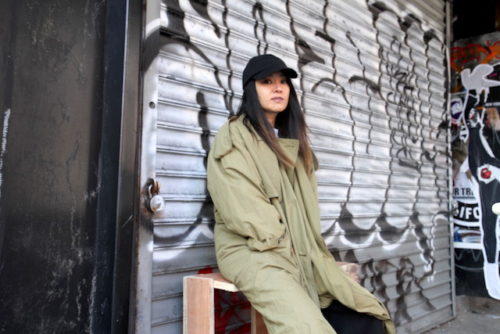
What do you think the music scene is like [in Tokyo]? Has it changed? If you were growing up in there now, would you be able to do the stuff you wanted to do?
Maybe not. I like to create music in English, not in Japanese. I couldn’t find my way to write in Japanese because maybe I think too much in Japanese. Also the sound-Japanese language is too square for my ears. When I have a melody, English has a rhythm. There’s a flow to the sound. I think that part is big. If I want to make Japanese songs I would probably make more old school pop music in Japan. There is a word called the kay?kyoku-the style of music before J-pop. In the ‘70s it was big. I see more beauty in there.
I feel like I left Japan already so I’m not developing my Japanese skills that much. I go back there for three weeks and then come back here. I’m not really in the society. I go back at least once a year. But every time I go back there I buy a lot of books so when I’m reading in Japanese I do feel very strongly about, “Wow, I’m Japanese” and that thought is pretty amazing. It makes me feel crazy to think about how there is no good translation of the Japanese language.
My mother says that about books and poetry in translation. So much gets lost. I guess that’s what they say about English. Is that it’s very efficient to communicate with but it’s not that pretty.
Not romantic? Yeah, that’s true. Japanese language is so romantic.
English sounds very angular.
Yeah, very practical. I just read some poetry of a French writer. I was reading it in Japanese and I happened to read it in English. And I felt like, what the fuck, it’s completely different. The Japanese translation was way better, and more romantic.
When I’m speaking English I’m more direct, but when I think in Japanese I feel like I have an American mentality because I’ve been here for a long time. But still I understand that romanticization of it. I have two different minds.
Is your personality different? Because I feel like, when I go back to India and you start thinking in a language that isn’t English it affects how you behave and interact with people a little bit. Do you think you’re a different person when you’re in Japan?
Yeah. I feel very alien in a way. I feel that feeling here as well sometimes. But I’ve always felt that way since I was little, in Japanese society. Maybe because my parents are very different. They came from very different worlds as well. I was always confused. I always have two different kinds of worlds. Not fighting but always in a middle. On a thread, or line between them. That kind of stance made me think about New Optimism. Because I feel like neither of them. But this line is a spot for me.
That thin line where you’re walking becomes where you live or work from.
It’s not about land, or the country, it’s about the mind. And that’s what I feel is New Optimism. When I talk to people, they all say they understand. Because we’re in New York, we’re all from different places. New Yorkers, we’re all dealing with that.
You’re creating a fashion brand?
It’s called New Optimism as well. It’s the same name, because it’s the same idea.
Now I’m just selling at the Nagoya store which is so interesting because all the customers there are all listening to New Optimism music too. So they are wearing the New Optimism clothing as well. So when I went there to play a show in Nagoya it was kind of insane.
It was like a cult kind of vibe?
[laughs] Exactly.
Sick.
I made berets, which I like because they’re military-style. Japan’s defense force uses burgundy. America is using green or blue. New Optimism is different. I asked the factory to create an original color. Nobody has that color. I feel like [New Optimism fans are] a defense force. [laughs]
My two friends who are selling New Optimism, they always ask me, “Why did you create this?” They’re always looking for stories. I do have a very different process of making clothing. The majority of designers in Japan don’t think about “Why?” they are just selling. There’s no story.
When I’m in Japan it’s very hard to find something I like. It’s very trend-oriented. Everywhere you go you see exactly the same style. There’s a lot of amazing creators making very unique things but you just find the way to go there, and that’s definitely a journey. It’s very, in a way, romantic to find the good stuff. But here as well, it’s so hard to find something you feel a connection to. It’s so fucking hard. That’s the reason it’s good. Because people always have an effort to find something.
It being easy to get something makes us kind of numb. It’s important to have a little bit of difficulty. Same thing with music. We don’t talk anymore about how difficult the music industry is.
Now, a lot of music I discover is pretty amazing. There’s a lot of amazing craftwork of sound coming up. Music is more complex. That’s what I feel. The level of understanding of music is higher right now.
You think people have more interest in hearing more outlandish stuff now? Maybe because of the availability of music when they were younger, because of the internet.
I feel so too. I feel [finding music is] like finding a gem in the mountain. That makes music fun. It’s super personal. That , to me, is already a story. Without it I feel like it’s just instant. You forget the story, like one month later. You never listen to that music. But I’m very happy to be creating still.

